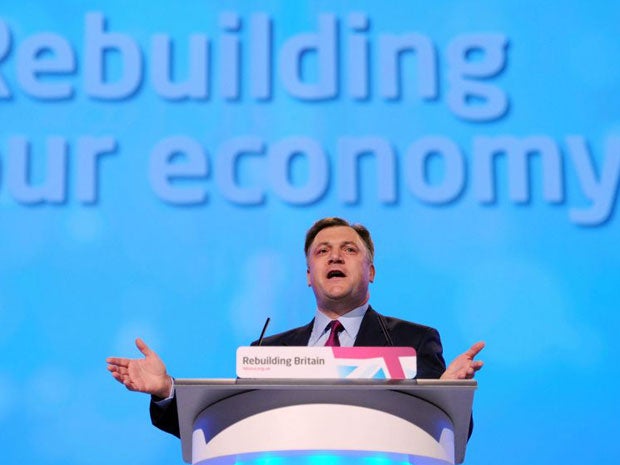Labour conference: Ed Balls promises Labour government would launch massive construction programme for Britain to build its way to economic recovery
The shadow Chancellor also tore into the Coalition for presiding over a return to recession by cutting too deep and too fast and for failing to invest in economic renewal.

Your support helps us to tell the story
From reproductive rights to climate change to Big Tech, The Independent is on the ground when the story is developing. Whether it's investigating the financials of Elon Musk's pro-Trump PAC or producing our latest documentary, 'The A Word', which shines a light on the American women fighting for reproductive rights, we know how important it is to parse out the facts from the messaging.
At such a critical moment in US history, we need reporters on the ground. Your donation allows us to keep sending journalists to speak to both sides of the story.
The Independent is trusted by Americans across the entire political spectrum. And unlike many other quality news outlets, we choose not to lock Americans out of our reporting and analysis with paywalls. We believe quality journalism should be available to everyone, paid for by those who can afford it.
Your support makes all the difference.Plans to help a future Labour government “rebuild Britain for the future” will be drawn up by the man who ensured the successful delivery of the London Olympics, Ed Balls told the Labour conference today.
Ed Balls invoked the spirit of 1945 today as he promised that a future Labour government would mount a massive construction programme to help Britain build its way to economic recovery.
The shadow Chancellor was scathing about the Coalition’s “failing economic plan”, but he warned his critics – including trade union chiefs pressing Labour to support pay rises – that the party would not embark on a “post-election spending spree”.
He said the Labour post-war Government had taken “tough and unpopular” choices, including the decisions to continue rationing and introduce prescription charges, but remained focused on the task ahead.
To applause from delegates at the Manchester conference Mr Balls added: “They learned from history and rejected the failed austerity of the 1930s.”
Where the 1945 Attlee government created the National Health Service and built “homes for heroes”, the shadow Chancellor envisaged a programme of investment in the national infrastructure designed to create jobs and produce economic growth.
He cited the need to roll out super-fast broadband across the country, replace the “antiquated” National Grid, invest in nuclear and renewable power, improve flood defences, replace or reinforce the Thames Barrier and boost rail and airport capacity.
Mr Balls announced that Sir John Armitt, the chairman of the Olympic Delivery Authority, would set up a commission to advise Labour on the feasibility of such projects.
He admitted that previous major construction schemes, such as the Channel Tunnel rail link and the Crossrail line in London, took too long under the last Labour government to be completed.
And he pointed to the Coalition conflict over whether to build a third runway at Heathrow Airport as proof of the need to reach national agreement on such schemes.
“We need a comprehensive long-term plan to rebuild Britain's infrastructure for the 21st century and a cross-party consensus to deliver it,” he said.
Mr Balls had a sobering message for union leaders when he hinted that an incoming Labour government could accept the overall spending limits it inherited from Chancellor George Osborne.
He told the conference: “We must be upfront with the British people that under Labour there would have been cuts and that – on spending, pay and pensions – there will be difficult decisions in the future from which we will not flinch.”
He said: “The longer this Government staggers on with a failing economic plan, the worse it will get and the harder the job will be. Hard times will last longer than all of us hoped. And we cannot promise to put everything right straight away.”
Dave Prentis, the general secretary of Unison, and Len McCluskey, the leader of Unite, attacked the Labour leadership for backing the Government’s public sector pay freeze.
Mr McCluskey said there should be no “false choice” between jobs or wages and was given a standing ovation at the conference as he challenged the Labour leader, Ed Miliband, to “come out of the shadows” and embrace a “radical alternative” to the Coalition.
Join our commenting forum
Join thought-provoking conversations, follow other Independent readers and see their replies
Comments